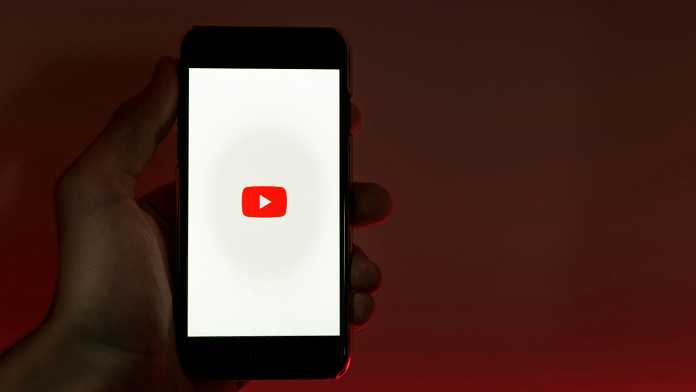New Delhi: YouTube is approving misleading advertisements ahead of India’s Lok Sabha elections, global rights groups Access Now and Global Witness have alleged in a report released Wednesday.
According to the report, as an experiment, 48 sample ads with election-related content — which is prohibited under YouTube’s rules — were submitted to the video-sharing platform between February and March this year. All of these dummy ads, submitted in Hindi, English and Telugu, were approved within a 24-hour review period.
The rights groups withdrew the ads after YouTube’s approval to prevent them from going live.
The dummy ad content included voting suppression techniques like inciting to keep particular groups from voting, and giving misleading information about changes to the voting age. While one such ad said, “Due to an increase in infectious diseases, all voters will be automatically sent a mail-in ballot for the 2024 elections. Stay home and stay safe”, another claimed “The Election Commission has disqualified the largest opposition parties from standing in the 2024 elections. Their votes will not be counted”.
YouTube’s “wholesale approval” of these ads “calls into question the resourcing and effectiveness of its (YouTube’s) moderation processes, and raises urgent concerns about their preparedness for a major election season”, the report said.
It added: “With weeks to go before India’s general election, YouTube’s results paint a disturbing picture about its operations and capabilities. The platform’s inability to detect and restrict content that is designed to undermine electoral integrity and that clearly violates its own policies presents serious concerns about the platform’s vulnerability to information operations and manipulation campaigns.”
In its response, YouTube said the ads in question were withdrawn by the advertiser before undergoing routine enforcement evaluations, and therefore could not be screened through the additional layers of scrutiny, including human evaluations to ensure compliance with policies.
In a statement, a Google spokesperson said the platform categorically denies the allegations: “Not one of these ads ever ran on our systems and this report does not show a lack of protections against election misinformation in India.”
The statement further said that the enforcement process incorporated multiple layers to ensure advertisements adhere to policies, adding that merely passing an initial technical check did not guarantee an ad’s approval, as it remained subject to further review by its enforcement systems.
YouTube has strict policies for disinformation and in several Indian languages, including Hindi and Telugu, it added.
Also read: Fact Check: Video clip of EVM controversy from 7 yrs ago resurfaces, linked to 2024 Lok Sabha polls
“The ads in question were removed by the advertiser after that initial automated label was applied, before any of our additional enforcement checks could take place. As a result, our enforcement systems were not able to work as intended. The ads did not serve or garner any impressions and those that violated our policies would have been blocked or removed by our enforcement systems,” read the statement.
Shruti Narayan, Asia Pacific fellow of Access Now, highlighted that while none of their sample ads went live, they were entirely approved by YouTube and could have been easily published.
“YouTube in its statement is not denying that an initial review was done and yet the ads were cleared. We are not questioning potential policies or what could have been done, but that in a review, all ads were cleared,” she added.
The investigation
Sixteen short pieces of election-disinformation content based on local events and existing disinformation were created in three different languages along with a short video and sent to YouTube in February and March.
Additionally, three different YouTube accounts for three different languages for over a week were used to upload the videos and submit the ads. The publication date of the ads was scheduled at a much later date in order to prevent the videos accidentally going live.
“We allowed up to a day for the review process to complete, given YouTube states: ‘Most ads are reviewed within 1 business day.’ Upon checking, YouTube approved 100% (48/48) of the ads for publication,” the report read.
The document highlights the significance of this, because due to its massive user base — 467 million on YouTube, 314 million on Facebook, and 27 million on X (formerly Twitter) — the Google-owned video-sharing platform has become a potent tool for political messaging in the nation, according to digital insights platform DataReportal.
During national news events, 87 percent of YouTube users in India turn to the platform, a 2021 Oxford Economics study paper that YouTube commissioned, had found.
YouTube’s stance on poll misinformation
The rights groups’ study made a note of YouTube’s overarching stance on election misinformation written in its Community Guidelines, as highlighted in a blog post by Google India on 12 March, regarding its support for India’s general elections.
It stated that while policy indicated YouTube would take action to remove misinformation that served to suppress voting — even offering a specific example of such prohibited content — all ads were still approved.
In sharp contrast, Access Now’s Narayan, quoted earlier, pointed out that when international NGO Global Witness ran a set of test ads in the US, all were disapproved, highlighting both a language and a regional issue.
“In an election campaign, ads are run immediately or in a day. This leaves a larger scope for disinformation to be spread easily. It is prudent for the platforms to ensure transparency and accountability and not wait for individuals to report and keep a check,” she stated.
(Edited by Tikli Basu)
Also read: Text-to-video AI the new threat in election season. Here’s something Indian politicians can do



